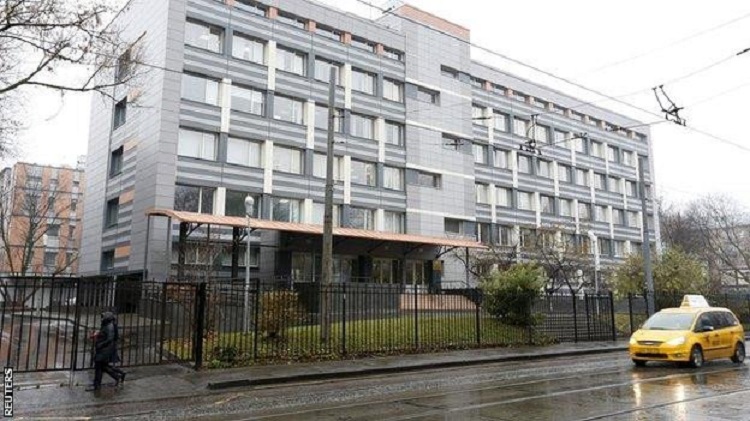
A three-person World Anti-Doping Agency (WADA) team will return to the Moscow Laboratory on Wednesday (January 9) after the organisation claimed Russian authorities have resolved the issue surrounding certification of equipment.
An update issued by WADA confirmed a second attempt would be made to retrieve the data at the facility, after a five-member team left empty-handed last month.
Russian authorities had blocked their work due to equipment that “had not been certified under the country’s law”.
WADA had been hoping to take control of the Laboratory Information Management System (LIMS) stored at the laboratory which they say could be used to catch more drugs cheats.
Access to the facility before December 31 was a compulsory condition set when the WADA Executive Committee controversially lifted the suspension of the Russian Anti-Doping Agency (RUSADA) on September 20.
With the deadline having elapsed, calls have been made for RUSADA to be declared non-compliant again.
WADA have now stated that the “issue raised by the Russian authorities in relation to the certification of the equipment under Russian law” has been resolved, enabling their expert team to return.
An independent Compliance Review Committee (CRC) meeting is set to discuss Russia’s compliance status on January 14 and 15, with a recommendation then set to be made to the WADA Executive Committee.
The Executive Committee will then consider the recommendation in a conference call.
WADA President Sir Craig Reedie has claimed that the organisation is still working on the basis that the deadline was missed and appeared to suggest RUSADA could still be declared non compliant even if the data is acquired.
“While WADA is obliged under the International Standard for Code Compliance by Signatories to give every opportunity to RUSADA, we are continuing to act on the basis of the 31 December deadline having been missed, with all the consequences that failure could bring,” he said.
“This week’s mission to Moscow is not only about us following due process and precedent.
“If the mission is successful in acquiring the data, it will break a long impasse and will potentially lead to many cases being actioned.
“Regardless, in the short-term, the ExCo will be considering whether RUSADA should maintain code-compliance status alongside anti-doping organisations of other major sporting nations that enjoy the same.”
The WADA CRC have faced pressure to call an urgent meeting following the missed December 31 deadline, with critics suggesting Russia had been handed a “two week extension” in which to comply.
There are also claims that the data could have been manipulated or tampered with.
CRC chair Jonathan Taylor has defended the WADA process, insisting that Russian authorities needed a fair opportunity to make a submission and by following the “due process” there would be less risk of legal challenges.
In the latest update from WADA, Taylor insisted the CRC regularly received late information from signatories on compliance issues and that they would treat the Russian case “no differently” to those.
“When the International Standard for Code Compliance by Signatories was drafted, all stakeholders were very keen to ensure that declaring a signatory non-compliant was a last resort, to be pursued only after the signatory has been given every opportunity to comply and failed to take them,” he said.
“The process set out in the Standard, which came into force in April 2018, duly reflects that strong stakeholder sentiment.
“As a result, the CRC regularly receives late information from signatories ahead of its meetings, which may or may not demonstrate compliance with the outstanding requirements.
“It will treat this case no differently, reviewing in detail all information submitted by: RUSADA and the Russian authorities; the WADA audit team that visited RUSADA mid-December; the WADA extraction expert teams; and WADA’s internal Compliance Taskforce.
“It will then make its recommendation to the WADA ExCo, entirely independently and without any outside influence, as we have always done.”
WADA added that if the CRC recommend that RUSADA be declared non-compliant and the Executive Committee agreed, WADA must then notify RUSADA.
Should they dispute WADA’s assertion of non-compliance, it would have 21 days to notify WADA and the matter would then be referred to the Court of Arbitration for Sport for a final decision.
WADA’s Executive Committee voted 9-2 in favour of lifting RUSADA’s ban in the Seychelles in September but the move was greeted by a backlash from various athletes and officials.
The reinstatement came despite Russia not meeting two key re-compliance criteria – admission of the McLaren Report which outlined much of the doping evidence against them – and access to the Moscow Laboratory.
In response WADA insisted that the move broke a period of deadlock and that RUSADA would simply be banned again if the laboratory was not opened.
They said the information collected there would allow the possibility of catching more cheats while potentially exonerating other athletes.
WADA had already obtained some information from the LIMS database which was shared with sporting bodies.
This was achieved via a whistleblower, however, rather than through any assistance from Russia.
Should they be provided with the data, WADA previously stated they would seek to re-analyse samples by no later than June 30, 2019.
three-year suspension began in November 2015 following allegations of state-sponsored doping in Russian athletics.
Revelations of more widespread cheating at events including the 2014 Winter Olympics in Sochi then emerged and the IOC forced Russia to compete under a neutral flag at Pyeongchang 2018 in February. INSIDE THE GAMES
































